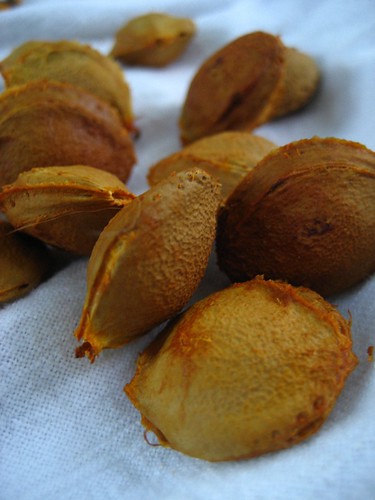 Very few acts in cooking allow us to smash things with a hammer. It's sad really. Sure you can bludgeon a piece of veal with a meat tenderizer like some barbarian, but it's not the same as precision strikes with a hammer as its heft sits gingerly in your palm before the gripping, pinpoint blow.
Very few acts in cooking allow us to smash things with a hammer. It's sad really. Sure you can bludgeon a piece of veal with a meat tenderizer like some barbarian, but it's not the same as precision strikes with a hammer as its heft sits gingerly in your palm before the gripping, pinpoint blow.However the production of noyaux from a squillion apricot pits left over from jam making is the perfect excuse to break out the tool kit and work out some frustration. Indeed, it's simply the most efficient way to go about it and get out any pent up rage you might have about some jerkwad dinging the crap out of your car door and not leaving a note the motherf***er.
 Anyways, if you aren't familiar noyaux (pronounced NWI-oh) are the pits from stone fruit, primarily from cherries or apricots. Delicious nuggets of nature that with nimble fingers delicately sew into your treats an almond flavor that wears a sweeter veil. The shells posses a less almondy fragrance but shadows of their former fruity overcoats that once embraced them linger.
Anyways, if you aren't familiar noyaux (pronounced NWI-oh) are the pits from stone fruit, primarily from cherries or apricots. Delicious nuggets of nature that with nimble fingers delicately sew into your treats an almond flavor that wears a sweeter veil. The shells posses a less almondy fragrance but shadows of their former fruity overcoats that once embraced them linger.For the most part noyaux are used for flavoring ice creams, custard, apricot jams, or eau de vie. However, there is some argument that they're harmful. True, the pits have the tiniest amount of prussic acid - you probably know it as hydrogen cyanide - which is poisonous. Given, eating one of these isn't going to kill you. Eating a small mountain of them raw might. A handful might result in a stomachache. Furthermore when you mix prussic acid with water the acid will leach out of the pit and become stronger. Doing a double roasting eliminates the enzymes and makes it safe for use.
 Of course, nowadays the pits are being used for studies to help alleviate or cure cancer as the acid is balanced enough in the pit to keep it free from most infections yet stiff function as a source of germination for a tree. Indeed, the acid is thought to be a precursor to amino acids meaning it may be a primary source to the origin of life. Strange for something that we recognize as a substance that snuffs it out.
Of course, nowadays the pits are being used for studies to help alleviate or cure cancer as the acid is balanced enough in the pit to keep it free from most infections yet stiff function as a source of germination for a tree. Indeed, the acid is thought to be a precursor to amino acids meaning it may be a primary source to the origin of life. Strange for something that we recognize as a substance that snuffs it out.Right now, I plan to create my own almond extract, or should I say noyaux extract. This means I'm chucking them in a bottle with vodka. I'm throwing a few pieces of the shells in as well in hopes to give the extract a curious tease of apricot - just enough so the taster pauses to question what familiar taste just flitted across their tongue. I'll be sure to update on how it goes as time progresses.

LINKS:
Cherry Pits: Poisonous? Edible? Usable Culinarily? - By Shuna Lydon









OK, so if I can buy apricot kernels at Trader Joe's (I'm lazy) should I roast them first before making ice cream?
ReplyDeleteKate: Those are already way roasted, not sure they would work.
ReplyDeleteWhat a super interesting post. I have never tried this but next year I shall.
ReplyDeleteCool post, Garrett! Never done this before, and I may just, if only to make One More Esoteric Liqueur...
ReplyDeleteGarrett -- I'll test it out and let you know!
ReplyDeleteI find myself wondering if I'm going to fish those cherry pits from the farmer's market out of last nights trash, or just go get new ones?
ReplyDeletegaleforcewind: A basic point and shoot from Canon.
ReplyDeleteI think you have the premise for your first cookbook: Cooking with a Hammer.
ReplyDeleteAnd it hadn't occurred to me to roast my noyaux before putting them in my jam. Rather obvious in retrospect, since I always roast or toast nuts and seeds. Next time!
When I was a kid we had several apricot trees. When mom made canned apricots, we kids would spread out the apricot pits and let them bake in the sun for a few days, and then we'd crack them open with a hammer and eat them like nuts. Delicious! Never thought they might have more formal culinary uses, but the taste was wonderful.
ReplyDeleteI'm glad i found your post... i bought a case of my favorite blenheim apricots this week at the farmer's market in hopes to make jam & something with the noyaux... it's hard to find info on how to make extracts or how to use these kernels - but i'll give your directions a try.
ReplyDeleteThanks!
How long and at what temperature do you recommend roasting the pits for?
ReplyDelete